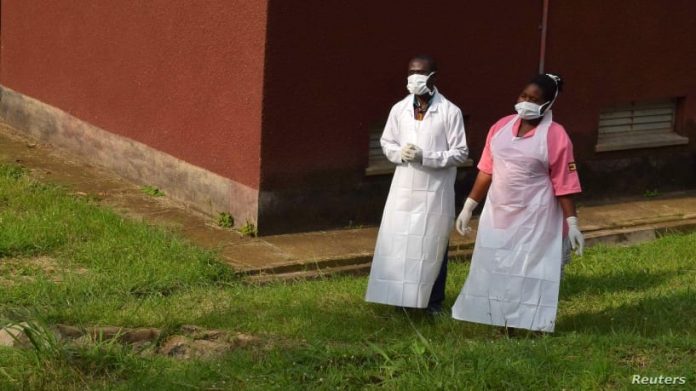Uganda is set to repatriate the five confirmed and suspected Ebola patients back to the Democratic Republic of Congo.
The five cases are all from the same family that recently travelled to DRC to attend the burial of a relative, who succumbed to the deadly virus.
“This epidemic is in a truly frightening phase and shows no sign of stopping,” said Jeremy Farrar, an infectious disease specialist and director of the Wellcome Trust global health charity, which is involved in fighting Ebola.
“We can expect and should plan for more cases in DRC and neighboring countries,” he said, adding:
“There are now more deaths than any other Ebola outbreak in history, bar the West Africa epidemic of 2013-16, and there can be no doubt that the situation could escalate towards those terrible levels.”
The current Ebola epidemic began in August last year in eastern Congo and has already infected at least 2,062 people, killing 1,390 of them.
The West Africa epidemic infected 28,000 people and killed 11,300, mostly in Liberia, Guinea and Sierra Leone.
The viral disease spreads through contact with bodily fluids, causing hemorrhagic fever with severe vomiting, diarrhea and bleeding.
World Health Organization Director-General Tedros Adhanom Ghebreyesus will reconvene an emergency committee Friday to decide whether the outbreak is an international public health emergency and how to manage it, a WHO statement said.
Authorities have struggled to contain the disease partly because health workers have been repeatedly attacked in conflict-ravaged eastern Congo, the epicenter of the outbreak.
This year, the WHO has documented 174 attacks on health care workers and facilities in Congo, causing 5 deaths and 51 injuries of health care workers and patients, Geneva-based spokesman Tarik Jasarevic told Reuters on Wednesday.
There is widespread public mistrust of the Congo government and health workers from outside the region, giving rise to rumors that the disease is a ruse to try to rig elections in the area, where dozens of armed groups operate.
Other rumors accuse health teams of spreading the disease.
Many victims have sought treatment with traditional healers instead.
About Ebola Virus
Ebola is a rare but deadly virus that causes fever, body aches, and diarrhea, and sometimes bleeding inside and outside the body.
As the virus spreads through the body, it damages the immune system and organs. Ultimately, it causes levels of blood-clotting cells to drop. This leads to severe, uncontrollable bleeding.
The disease was known as Ebola hemorrhagic fever but is now referred to as Ebola virus.
It kills up to 90% of people who are infected.
What is Ebola?
Ebola is a deadly disease caused by a virus. There are five strains, and four of them can make people sick. After entering the body, it kills cells, making some of them explode. It wrecks the immune system, causes heavy bleeding inside the body, and damages almost every organ.
The virus is scary, but it’s also rare. You can get it only from direct contact with an infected person’s body fluids.
How do you get it?
You get Ebola from a person who has the virus, and only while he or she has symptoms. People pass it to others through their body fluids. Blood, stool, and vomit are the most infectious, but semen, urine, sweat, tears, and breast milk also carry it.
To get Ebola, you’d have to get these fluids in your mouth, nose, eyes, genitals, or a break in your skin. You could also pick it up from items that have fluids on them, like needles or sheets.
How You Won’t Get Ebola
You can’t get Ebola from casual contact, like sitting next to an infected person. Air, food, and water don’t carry the virus. But kissing or sharing food or a drink with someone who has Ebola could be a risk, since you might get his saliva in your mouth.
What are the symptoms?
It can take from 2 to 21 days, but usually 8 to 10 days, after infection for signs of Ebola to appear. Symptoms can seem like the flu at first — sudden fever, feeling tired, muscle pains, headache, and sore throat.
As the disease gets worse, it causes vomiting, diarrhea, rash, and bruising or bleeding without an injury, like from the eyes or gums.





















